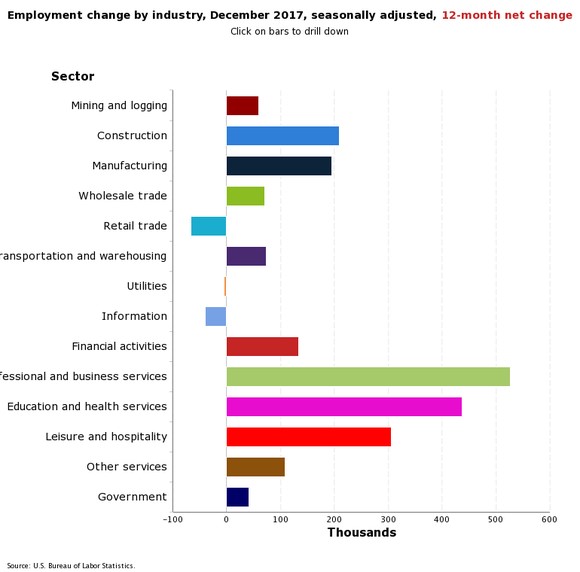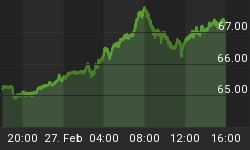The Amazon of today is hardly recognizable from its humble roots as an online bookseller two-and-a-half decades ago. From groceries and furniture to automotive and fashion jewelry, Amazon is the world's largest online marketplace (by revenue), selling more than half a billion products directly from its stores and also from third-party merchants.
It might be too harsh to label Amazon an oligopoly, but it would not be a stretch to suspect that Amazon could be killing traditional retailers especially of the brick-and-mortar type. The Bureau of Labor Statistics says the retail sector lost 67,000 jobs in 2017, by far the worst by any sector. Nearly all other industries, including stodgy sectors like government, recorded positive growth.
During that stretch, Amazon recorded sales of $178 billion, a massive 31 percent growth compared to a mere 3.5 percent by the retail industry.
Source: Bureau of Labor Statistics
With such incredible dominance, there are only a handful of retailers that have little to fear from the e-commerce giant (Amazon does not sell prescription drugs and guns, yet).
Yet, some have more to fear than others. Here are the 5 retail industries that might not survive an Amazon onslaught:
#1 Grocery Stores

(Click to enlarge)
Source: Forbes
Amazon owns a thriving groceries business thanks to its 2017 acquisition of Whole Foods for nearly $14 billion. Amazon now owns 18 percent of the U.S. online grocery market, double second-placed Wal-Mart's share. Related: The American Dream Is Drowning In Debt
Amazon's grocery stores are brick-and-mortar affairs much like Amazon Go stores, and they’re fully automated because the shopping of the future is all about removing the hassle of checking out. The company says it plans to open thousands of such physical stores, which will likely have a huge negative impact on the rest of the industry.
#2 Department stores
Department stores such as Sears, Macy's and J.C. Penney have been struggling badly over the past decade with ever-dwindling store traffic.
While part of that problem is of their own making, it’s also due to the growing popularity of online stores. Indeed, it's probably not a coincidence that department stores have lost nearly $30 billion in revenue since 2005 at a time when Internet retailers, led by Amazon, gained a similar margin of sales. Amazon launched Prime Wardrobe in 2017--yet another nail in the department store coffin.
#3 Book stores
Selling books might no longer be Amazon's gravy train, but the company is still causing sleepless nights for physical bookstores such as Barnes and Noble.
Amazon has established close ties with hundreds of publishers which, coupled with lower prices, has lured more people to order their favorite copies from the online retailer.
Meanwhile, Barnes and Noble has seen its sales shrinking with revenue contracting nearly 6 percent during the last quarter. Smaller bookstores might be faring even worse.
#4 Consumer staples
Amazon CEO Jeff Bezos' grand vision is to turn Amazon into a one-stop-shop for everything that can be sold through an online store. To that end, the company recently launched a consumer staples division that sells its own generic brands. And, it's been working …
Related: Tesla Could Be The Biggest Loser In The Trade War
UBS says that online battery sales are likely to hit 17 percent of industry sales by 2025--up from 5 percent currently.
Don't be surprised if Energizer soon joins the 20 large retailers who filed for bankruptcy protection in 2017.
#5 Shoe stores
Sneaker retailers beware: Amazon is coming for you. More and more customers now shop for shoes directly on Amazon due to the convenience and fast delivery.
Even well-heeled shoe companies are feeling Amazon's heat, with Foot Locker planning to close 110 more stores in 2018 on top of the 147 it shut down in 2017. Nike, Adidas and Sketchers are probably not too pleased with Amazon, either.
By Michael Scott for Oilprice.com
More Top Reads From Safehaven.com:
















